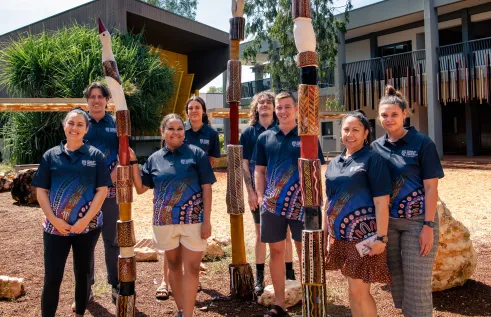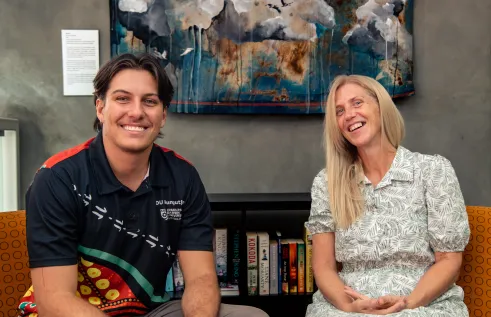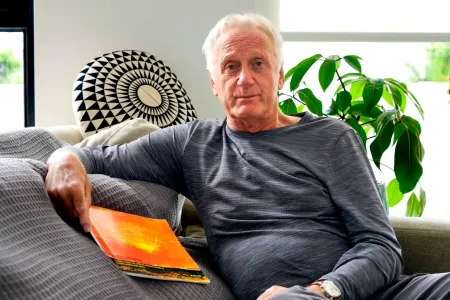News
CDU graduate hits the right notes to improve First Nations language and literacy
A Charles Darwin University (CDU) graduate has used the power of music to help improve language and literacy skills in children across Australia, including First Nations children in remote NT communities.
Over three years, Master of Education graduate Chris Aitken, from Melbourne, produced a collection of songs and stories written by children living in 50 remote communities across Northern Australia – including Peppimenarti, Barunga, Ngukurr and Belyuen in the NT.
“Children from remote communities have deep and meaningful connections with their families, their land and each other,” Mr Aitken said.
“There’s an extreme limitation in teaching within four walls of the classroom – when you teach and learn On Country with these children, their thoughts and ideas are just boundless, and it really comes through in their excitement to create songs and stories about their lives.”
Mr Aitken’s culturally inclusive project incorporates values of place-based learning, interpersonal understanding, local wisdom, local language and language that children want to use.
During his Masters, Mr Aitken supported the writing, recording and illustration of four songs, including the book Spiritual Dreaming which was published in his first year of studies.
He also collaborated with urban and regional schools in Victoria and Western Australia, producing 180 illustrated books and 1200 original songs with young students.
“I want to inspire young people to write their own books. Since I’ve graduated, I hope to write a resource to support educators who want to use music as a tool for teaching language and literacy, especially for kids who are in remote and very remote communities,” he said.
This capstone education project allows educators to consolidate years of experience and upskill their method of teaching through different media, such as videos, books, and recordings.
CDU Lecturer in Education Sue Smith said the postgraduate program provides opportunities for teachers to reframe their pedagogical approaches and be guided by children’s autonomy and ownership of their education.
“Chris has drawn on 20 years’ worth of experience in teaching literacy and language to children from various backgrounds,” Dr Smith said.
“His work demonstrates how teachers can work with the strengths of their students, where the concept of two-way learning is inherent in the process of interaction so that children are encouraged to share their ideas about the world around them and lead the conversation.
“It’s a simple yet powerful technique. On top of this, integrating First Nations languages into these songs and stories has made an even greater impact for children in remote communities, as active learners of their culture and Country.”
CDU Faculty of Arts and Society Pro Vice-Chancellor Professor Ruth Wallace said CDU education graduates have collaborated with First Nations communities for decades to respectfully collect and preserve culturally significant language and ways of teaching.
“First Nations ways of passing on culture, story and language to younger generations have evolved for tens of thousands of years,” Professor Wallace said.
“Elders are facilitators in the process of children’s learning and their continuing education. By working together with students to preserve language through song and story, ancient ways of knowing are respectfully exchanged in a culturally competent approach to teaching.”
For more information on education courses available at CDU, visit here.
Related Articles

CDU students ready to make their mark at Indigenous Nationals games
For the second year ever, a team of 14 talented and athletic Charles Darwin University (CDU) students will compete at the upcoming Indigenous Nationals games, set to take place in Melbourne next week.
Read more about CDU students ready to make their mark at Indigenous Nationals games
CDU joins celebration of the Barunga Statement’s 35th Anniversary at annual festival
The historic Barunga Statement, a pivotal moment in the journey towards First Nations rights in Australia, commemorates its 35th anniversary this year at the annual Barunga festival.
Read more about CDU joins celebration of the Barunga Statement’s 35th Anniversary at annual festival
First Nations students celebrated in Valedictory Ceremonies
The drive to help their fellow humans is at the forefront of the minds of two Charles Darwin University (CDU) First Nations students graduating this week.
Read more about First Nations students celebrated in Valedictory Ceremonies
